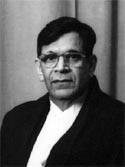
Meet Justice Y.K. Sabharwal and his Notable Judicial decisions
Justice Yogesh Kumar Sabharwal (1942–2015) served as the 36th Chief Justice of India from November 1, 2005, to January 14, 2007. Known for his expertise in constitutional, criminal, and service law, Justice Sabharwal authored 175 judgments and was part of 630 benches during his Supreme Court tenure. He previously served as Chief Justice of the Bombay High Court and as a judge of the Delhi High Court, building a reputation for integrity and judicial acumen.
Judicial Career and Philosophy
Justice Sabharwal’s career was marked by a focus on constitutional law, public interest litigation, and administrative reforms. He was recognized for his clarity, commitment to the rule of law, and willingness to take on complex and sensitive cases. He also advocated for the abolition of the death penalty, expressing personal opposition to capital punishment even as he upheld the law in court.
Landmark Judgments
1. Invalidation of Bihar Assembly Dissolution (2005–2006)
Justice Sabharwal headed the constitutional bench that declared the 2005 dissolution of the Bihar Legislative Assembly unconstitutional. The Court found that the Governor’s recommendation, which led to the dissolution, was not based on objective material. However, the bench stopped short of restoring the dissolved assembly, instead paving the way for fresh elections. This judgment reinforced constitutional checks on executive power and clarified the limits of gubernatorial discretion.
2. Ninth Schedule Judgment (I.R. Coelho v. State of Tamil Nadu, 2007)
In a landmark ruling, Justice Sabharwal led a nine-judge bench that held all laws placed in the Ninth Schedule of the Constitution after April 24, 1973, are subject to judicial review if they violate fundamental rights under Articles 14, 19, 20, and 21. This judgment ended blanket immunity for such laws, strengthening the protection of fundamental rights and reaffirming the judiciary’s power of review over constitutional amendments.
3. Delhi Sealing Drive (2006)
Justice Sabharwal presided over the bench that refused to grant relief against the large-scale demolition of unauthorized constructions in Delhi. The Court’s orders led to the sealing and demolition of thousands of illegal commercial establishments, sparking public debate on urban governance and judicial intervention in civic regulation.
Legacy
Justice Y.K. Sabharwal is remembered for his strong constitutional vision, assertive judicial review, and significant rulings on legislative and executive accountability. His judgments on the Ninth Schedule and Bihar Assembly dissolution have had a lasting impact on Indian constitutional law, affirming the judiciary’s role as a guardian of fundamental rights and constitutional propriety.












comments